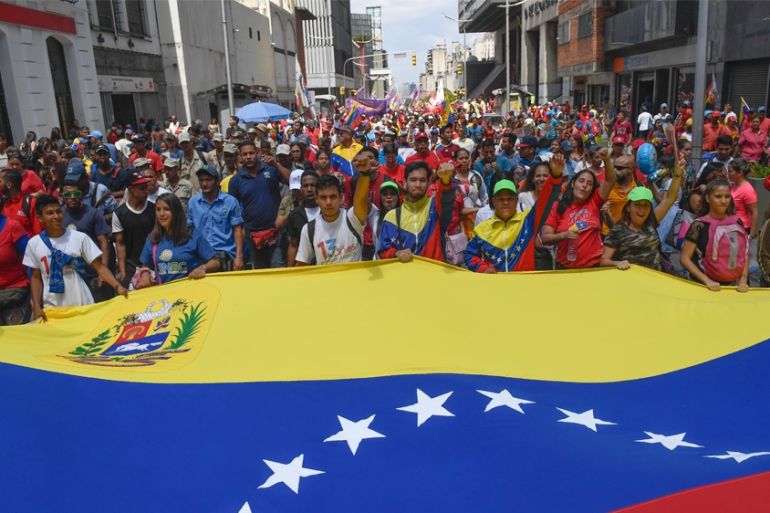US sanctions on Venezuela could exacerbate crisis, UN warns
Sanctions will worsen situation for millions in terms of access to food and health, human rights chief says.

The United Nations human rights chief has warned the latest US sanctions on Venezuela will significantly exacerbate the crisis for millions in terms of access to food and health, in a country already suffering from serious shortages of essential goods.
“I am deeply worried about the potentially severe impact on the human rights of the people of Venezuela of the new set of unilateral sanctions imposed by the US this week,” Michelle Bachelet said in a statement on Thursday.
Keep reading
list of 4 itemsUS blocks Palestinian push for full UN membership at Security Council
Why is Germany maintaining economic ties with China?
UN’s Libya envoy resigns citing no hope for political progress
“The sanctions are extremely broad and fail to contain sufficient measures to mitigate their impact on the most vulnerable sectors of the population.”
Her statement follows Washington’s decision on Monday to freeze all Venezuelan government assets in the US and baring transactions with its authorities.
The US move, which follows repeated rounds of sanctions against Venezuelan President Nicolas Maduro, includes the authorisation of penalties against “foreign persons” who provide support to his government.
“I want to be clear that this sweeping executive order authorises the US government to identify, target and impose sanctions on any persons who continue to provide support to the illegitimate regime of Nicolas Maduro,” John Bolton, the US national security adviser, John Bolton, said on Tuesday.
“We are taking this step to deny Maduro access to the global financial system and to further isolate him internationally,” he added from Peru’s capital, Lima, where he attended an international meeting discussing Venezuela’s political crisis.
‘Significantly exacerbate crisis’
Bachelet said she was concerned businesses and financial institutions were “likely to err on the side of caution and completely halt transactions relating to the Government of Venezuela”.
While transactions are not related to the provision of food, clothing and medicine, they are still likely to “significantly exacerbate the crisis for millions of ordinary Venezuelans”, Bachelet said as there will be over-compliance by financial institutions around the world that have commercial relations with the governments of the US and Venezuela.
|
|
Venezuela’s Vice President Delcy Rodriguez on Tuesday called the latest US sanctions a “global threat” and an attack on private property.
She warned that the US measures were likely to bring additional hardship to the Venezuelan people, who were already suffering from the effects of hyperinflation and a deep recession.
Once an oil-rich nation, Venezuela’s economic crisis predates the economic sanctions and mostly derives from the government’s failure to diversify its exports, as well as the mismanagement of the country’s energy assets.
However the sanctions imposed in August 2017 and in January 2019 have exacerbated the effects of the crisis and the humanitarian situation, Bachelet said, given that most of the foreign exchange earnings derive from oil exports, many of which are linked to the US market.
Those with influence in Venezuela and in the international community need to work for a political solution, she said.
About a quarter of Venezuela’s 30-million-strong population needs aid, according to the UN, while 3.3 million people have left the country since the start of 2016.
Political impasse
Venezuela has been mired in a political impasse since January when opposition leader Juan Guaido proclaimed himself acting president, quickly receiving the support of more than 50 countries, including the US.
|
|
Guaido invoked the Constitution to assume a rival interim presidency on the grounds that Maduro’s 2018 re-election was fraudulent.
He said on Wednesday that Maduro could help the country by abandoning the presidential palace, Miraflores. “That way, the sanctions will be lifted tomorrow,” he said.
Guaido added the sanctions were “penalties for those who steal and profit from misery”.
Maduro accuses the US of waging an economic war against his government.
Late on Wednesday, the Venezuelan president ordered his government’s representatives not to travel to Barbados for scheduled talks with the opposition starting on Thursday, blaming the US sanctions for the impasse.
The two sides began meeting in Barbados in July to seek a resolution to the country’s political stalemate.